Description
ABSTRACT
Access to Court and the Doctrine of Ripeness in Settlement of Chieftaincy Disputes in Nigeria
Gbenga Ojo*
This paper carries out a comprehensive appraisal of legal developments through case law on the effect of non-compliance with the condition precedents or statutory requirements for exhausting domestic or administrative remedies in settlement of chieftaincy disputes before seeking judicial remedy in the court. Some judicial authorities have held that, the requirements of exhausting domestic remedies before seeking redress in the court is unconstitutional because it is a clog on the right of citizens to have access to the court as guaranteed by the Constitution. After examination of the issues, this paper concludes that requirement of exhausting domestic remedies by the statutes is indeed constitutional.
INTRODUCTION
It is not open to any controversy that a chieftaincy dispute is justiciable right within the meaning of sections (6)(6)(b) of the 1999 Constitution as amended.1 The area of controversy is whether an aggrieved party in a chieftaincy dispute can proceed to court to ventilate his grievances without exhausting all domestic remedies provided for in the relevant Obas and Chiefs laws.2 One line of authorities3 held that access to court is constitutionally guaranteed and unrestricted. The effect is that, an aggrieved party could access the court without initiating or exhausting any domestic remedy. In fact, the provisions in the Chiefs’ laws that provide for exploring domestic forum before going to the court were held to be unconstitutional, null and void to the extent of their inconsistencies.4 The other line of authorities5 held that, exhausting domestic remedies before going to the court is a condition precedent and any action filed in the court before doing so is premature and ought to be struck out on the principle of administrative law called doctrine of ripeness. The effect is that, though the court has jurisdiction but the case is not ripe for judicial adjudication until the conditions precedent are exhausted. As soon as that is done, the aggrieved party, if still not satisfied, can seek redress in the court. This is mandatory and not discretionary.6 What makes the issue complex and incomprehensible is that there are Supreme Court authorities for the two parallel positions. The position canvassed in this paper is that the doctrine of ripeness is part of our administrative laws in Nigeria. The requirement of exhausting domestic remedies does not oust the jurisdiction of the court. It merely delays the right of the aggrieved party to have access to the court. If it were so, of course, it would have been unconstitutional, but it is not.
It is analogous to service of pre-action notice in cases involving statutory bodies or local governments. Pre-action notice, where required is mandatory.
* LL.M, BL. Lecturer, Faculty of Law, Lagos State University & Principal, Gbenga Ojo & Co
- Otapo v Sunmonu (1987) 2 NWLR (Pt 58) 587; Bamishile v Osasuyi (2008) ALLFWLR (Pt 423) 1300; Adegbenro v Akintilo (2009) 11 NMLR 335
- See for example, the Obas and Chiefs of Lagos State Law, Cap O3 2003
- Offor v Osagie (1998) 55 LRCN 2978; Odeyale v Babatunde (2009) 11 NMLR 301; Milad Governor of Ondo State v Adewunmi (1985) 3NWLR (Pt 13) 1; Edewor v Uwegba (1987) 1 NWLR (Pt 50) 313
- Offor v Osagie (1998) 1KLR (Pt 57)217
- Adesola v Abidoye (1999) 14 NWLR (Pt 637) 28 Bamishile v Osasuyi (2008) ALLFWLR (Pt 423) 1300; Aribisala v Ogunyemi (2005) 6NWLR (Pt 921) 213; Faloye v Omoseni (2001) FWLR (Pt 35) 723; Ikime v Adjemode (2001) 18 NWLR (Pt 745) 445; Olu of Warri v Kpereibayi (1994) NWLR (Pt 339) 41; Okomalu v Akinbode (2006) ALLFWLR (Pt 314) 211; Elesho v Governor of Ogun State (1990) 2 NWLR (Pt 133) 420 Egwanwemsi v Amaghizemwen (1993) 9NWLR (Pt 315)1
- Adesola v Abidoye, ibid

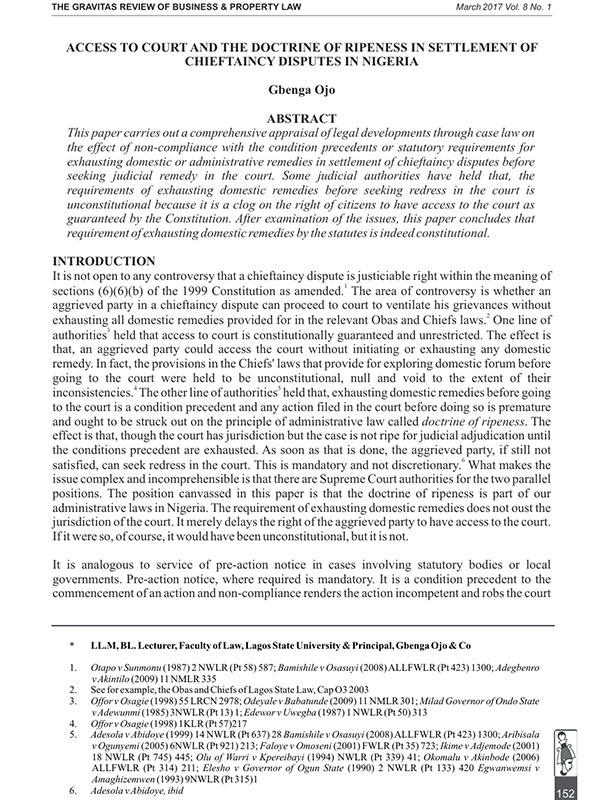
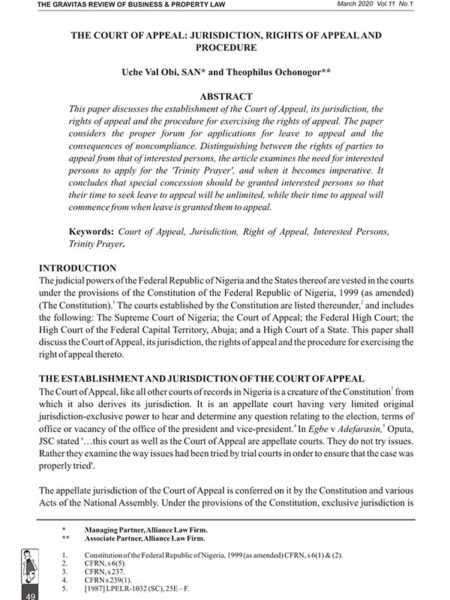
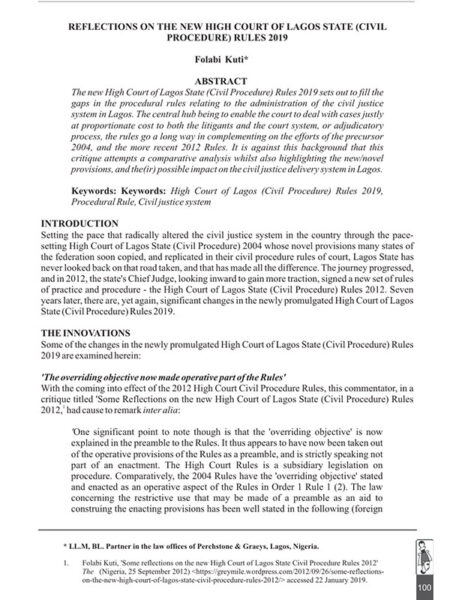
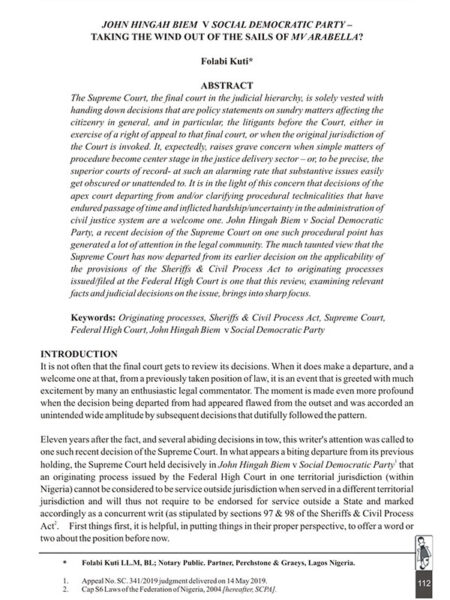
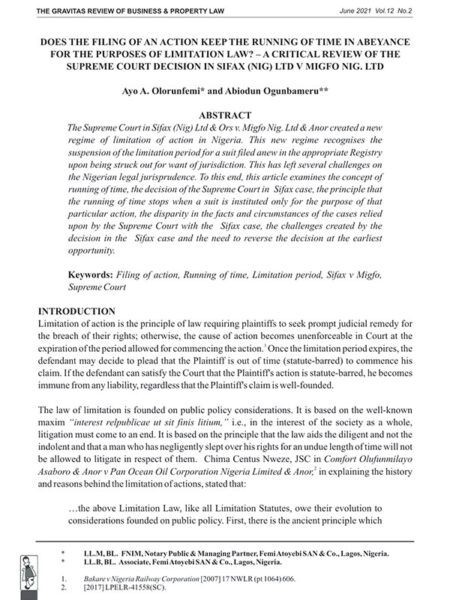


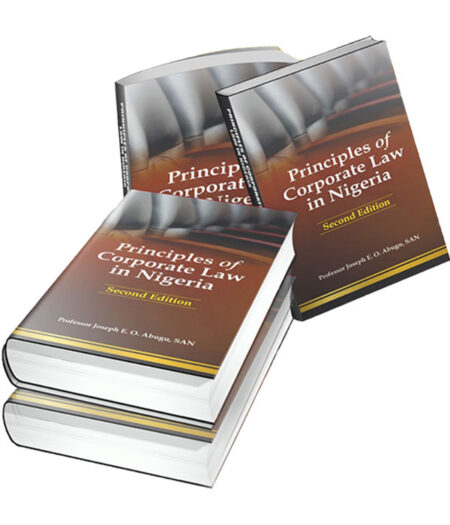
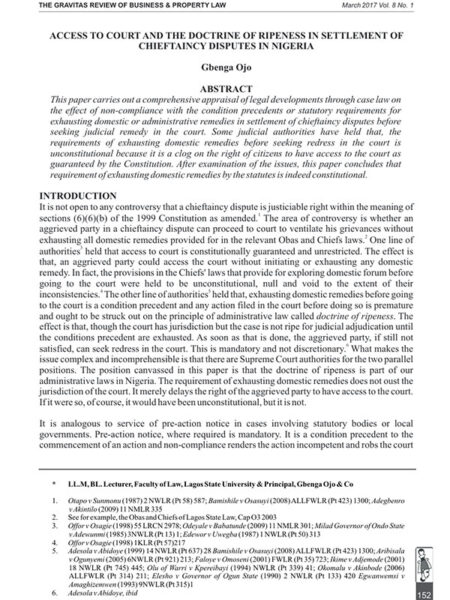
Reviews
There are no reviews yet.